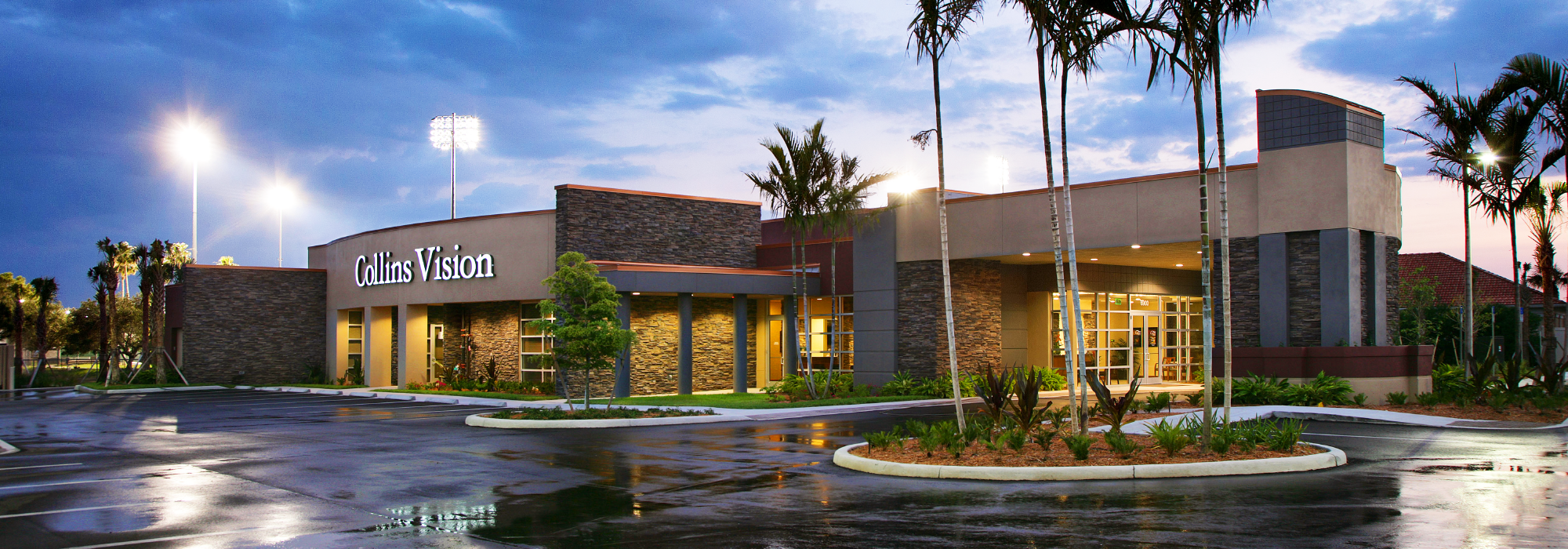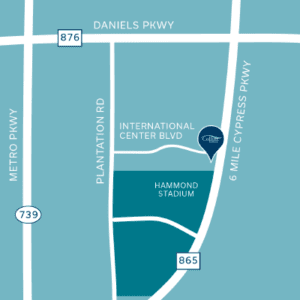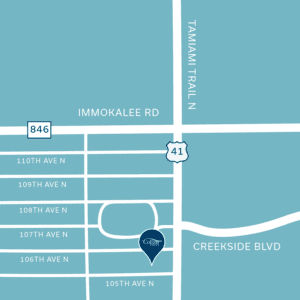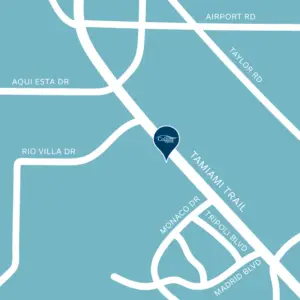ABOUT CATARACT SURGERY
what to expect during cataract surgery
Our surgeons perform cataract surgery on an outpatient basis, in Fort Myers and Naples, with the use of local intravenous sedation and topical anesthetic drops. The actual cataract procedure only takes about 15 minutes to perform. Nonetheless, patients can expect to spend about three to four hours at the surgery center, to allow for preoperative preparation and postoperative observation.
After the topical anesthetic eye drops have been administered, your surgeon makes a very tiny incision in the eye, that is so small it’s “self-sealing.” They then perform a technique called phacoemulsification. During this step in the procedure, your surgeon uses ultrasound energy to break up the cataract-diseased eye lens into microscopic particles, which he gently suctions from the eye. An intraocular lens (IOL) implant is then inserted into the eye to compensate for the removal of the eye’s natural lens. If bilateral surgery is being performed, the eyes are typically scheduled one to two weeks apart.
Collins Vision offers a wide range of IOL options, including multifocal lenses that allow patients to see well at multiple distances and astigmatism-correcting Toric IOLs. These premium IOLs allow patients to greatly reduce or even eliminate their daily dependence on prescription eyewear.
SEE THE DIFFERENCE
"At our practice, every little detail matters."
Your time, experience and results are as important to us as they are to you. Our goal is to exceed your expectations and create a unique experience where you are greeted with enthusiasm, taken care of in a timely fashion, and receive personalized care throughout your visit with us. When patients choose Collins Vision, they know they get both great outcomes and a great experience.

We know you have options, see what sets us apart.
Our Board Certified surgeons specialize in Refractive Cataract Surgery, where the goal is to remove a patient’s cataract and reduce their dependency on glasses at the same time. Refractive Cataract Surgery is an advanced procedure that goes above and beyond traditional cataract surgery to deliver exceptional results designed to fit our patients’ vision and their lifestyle. This is something very important to our busy Southwest Florida residents who enjoy golfing, playing pickle-ball, and reading without the hassle of wearing glasses.
Instead of meeting with another doctor for your surgical consult, you will meet with the surgeon performing your surgery. Your surgical consultation is an opportunity for your surgeon to examine the health of your eyes. In addition, you will discuss your lifestyle, hobbies, and your goals after surgery to decide on a plan together. Our hope is for you to leave your consultation feeling confident and excited about your upcoming surgery and potential new vision.
Each and every one of our surgical plans is customized by our surgeons depending on your lifestyle and the health of your eyes. In comparison to larger practices, take comfort in knowing that we go above and beyond by having our surgeons hand-select your intraocular lens to ensure superior surgical results.
Better technology means better visual outcomes, and Collins Vision is a leader in bringing the latest breakthroughs in eye care to the region. We pride ourselves on using the safest, most up-to-date technology including the use of a Femtosecond Laser to perform Laser Cataract Surgery, a variety of intraocular lenses, and the latest in diagnostic equipment.
All Collins Vision clinical physicians and surgeons have advanced certifications and are experts in their field. While the majority of your post-operative care is completed by one of our clinical physicians, we believe it is critical for you to also meet with your surgeon between your first and second eye surgeries. While this is not typical in most practices, our surgeons take the opportunity to review and examine the fine intricacies of how your first eye responded and make any necessary adjustments to your second eye’s surgical plan.
CATARACT SURGERY FAQs
Cataract surgery should be performed when vision loss interferes with your everyday activities such as driving, reading or watching TV.
Most of our patients report very little to no discomfort during or after cataract surgery. During surgery you will be given light IV sedation, and anesthetic drops will be administered to numb your eye. Afterwards, you can take over-the-counter pain medications if you feel any pain or irritation.
As with any medical procedure, cataract surgery can pose certain risks such as infection and bleeding. Before cataract surgery, you may be asked to temporarily stop taking certain medications that increase the risk of bleeding during surgery. After surgery, you will be instructed to use prescribed eye drops to help minimize the risk of infection.
Patients can expect their vision to be blurry the day after surgery as the eye is still dilated. Typically, you will experience your best vision two to four weeks after cataract surgery. Patients undergoing combined cataract and glaucoma surgery typically need longer healing time before gaining their maximum vision. For patients receiving multifocal or accommodating lens implants, their near vision may not be as clear as they desire initially, but will continue improving for months after surgery.
While the results of cataract surgery are permanent in that the cataract itself cannot come back, som epatients do experience a clouding of the capsule surrounding the lens a few months or even years later. If this occurs, an outpatient laser procedure called a YAG laser capsulotomy will be used to quickly and painlessly restore your clear vision.
Months or even years after cataract surgery, you may experience cloudy, blurry vision and/or glare and halos around lights at night, symptoms similar to when you had a cataract. During your cataract operation, the natural lens inside your eye was removed and an intraocular lens was placed inside of the lens membrane (also called a bag or a capsule). In about fifty percent of post-surgical cataract patients, the capsule will become hazy sometime after surgery. This interferes with light reaching the back of the eye, causing the need for Dr. Collins to perform a Yag Laser Capsulotomy which will help to restore clear vision.
Your procedure will take place at St. Mark’s Surgical Center. Although the procedure only takes but a minute, you can still expect to be at the surgery center for an hour to an hour and a half total. This is due, in part, to making sure your eye is fully dilated prior to seeing Dr. Collins.
Once dilated, you will then be instructed to sit in front of a machine similar to what we use when examining your eyes in our office. Dr. Collins then looks through the microscope to focus on the capsule clearly before applying the laser. The laser passes through the clear tissue of the front of the eye, through the IOL, and makes a small opening in the posterior capsule so that light can once again focus clearly on the retina.
A Yag Laser Capsulotomy is performed when the hazy capsule starts to affect your daily lifestyle due to decreased vision or glare. Most commonly this is between 6 months and 3 years after your primary surgery but it may happen sooner or much later. It is important, however, to wait at least three to four months after your cataract surgery for the procedure to ensure that your intraocular lens is stable. If a bilateral procedure is being recommended, the eyes will be performed separately to ensure safety and an optimal outcome.
Per your insurance guidelines, a Yag Laser Capsulotomy is a completely separate and identifiable procedure regardless of the type of intraocular lens inserted, and as such, is billed separately to your insurance company. Although the need for this procedure is common and is not related to the success of your cataract surgery outcome, it does not happen to everyone.
Following the procedure, no special treatment is required, and you may return to your routine daily activities right away. Your eye may still remain dilated for up to 48 hours following the procedure, and you may also notice a temporary increase in floaters. A surgery counselor will review pre-operative and post-operative instructions in detail at the time you schedule your procedure.
Patients may also experience symptoms of dysphotopsia. The term dysphotopsia is used to describe a variety of visual symptoms that result from light reflecting off, or being blocked by the edge of the intraocular lens (IOL). Dysphotopsias are generally divided into two categories: positive and negative. Positive visual changes involve symptoms of glimmering, flashes, starbursts, haloes, or streaks of light, while negative dysphotopsias are perceived as shadows or dark areas in the visual periphery. Typically these dysphotopsias are seen as an arc in the outer or lateral area of vision. It is important to know that sometimes, despite a perfect surgery, a patient can experience positive or negative dysphotopsia. While there is no way to predict its onset, for most patients, it is fortunately a temporary issue. In the vast majority of cases, the symptoms subside within a few weeks after surgery due to the process of neuroadaptation.




